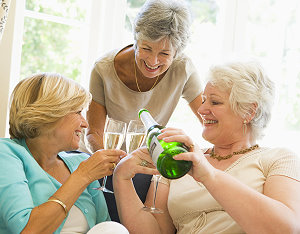It’s a happy time. The whole family has come together for a holiday meal together and now, it’s time for a toast. On break from College, this is the first time that Junior is able to join in. It’s now that it occurs to you… Should Pop be drinking with all his medication? He’s already got a wine glass in hand and is having a laugh with Junior. You have to make a choice, do you cause a scene or do you risk his health by letting him drink?
 It’s a question that often comes up at the last minute, when the bottle’s uncorked and you’re about to pour. Should you serve alcohol to a Senior? There isn’t one answer, but with the right information a Caregiver can make the right judgment call.
It’s a question that often comes up at the last minute, when the bottle’s uncorked and you’re about to pour. Should you serve alcohol to a Senior? There isn’t one answer, but with the right information a Caregiver can make the right judgment call.
The importance of Drinking.
Drinking alcohol, like driving, is often seen as a rite of passage, something that separates children from adults. Caregivers should be aware that restricting a Senior’s use of alcohol may be received as attacking their adulthood.
Reasons to “Take the Keys” to the liquor cabinet.
Unlike driving, there are few guides that help Caregivers decide if a Senior should “turn in the keys” to the liquor cabinet. Here are some reasons to think about restricting a Senior’s access to alcohol.
- Dangerous Alcohol and Medication Interactions: Many medications can have dangerous interactions with alcohol that lead to increased risk of illness, injury, or even death. The elderly are especially at risk due to the large amounts of medication they often take.
- Increased Effect of Alcohol: Several studies have shown that Alcohol has an increased effect on most Seniors, reducing their ability to function to a greater extent and for a longer period of time. This can be especially dangerous for Seniors suffering from cognitive impairment.
- Worsen Medical Conditions: Alcohol can worsen certain medical conditions, such as High Blood Pressure and Ulcers.
- Increased Risk of Injury: Drinking alcohol can greatly increase a Senior’s risk of injury from falls.
- Late Onset Alcoholism: Depression, social isolation, and physical pain can lead to Seniors abusing Alcohol later in life. This is a growing problem in the United States and one that often goes overlooked.
- Malnutrition: Drinking large amounts of alcohol on a regular basis can flood a Senior’s system with empty calories, quenching appetite and causing malnutrition without weight loss.
The Checklist
If you can answer ‘yes’ to any of the items on the following check list, it may be time to take control of your elderly loved one’s access to alcohol.
- Is there a risk of dangerous interaction between Alcohol and the Senior’s Medication? Is the Senior no longer able to respond appropriately to this risk?
- Does the Senior have a medical condition that is exacerbated by alcohol consumption? Is the Senior no longer able to respond appropriately to this condition?
- Does even a small amount of alcohol have an exaggerated effect on the Senior? Is the Senior no longer able to drink responsibly?
- Are there signs that the Senior is at higher risk of incidental injuries such as falls when they drink alcohol? Is the Senior no longer able to respond appropriately to this danger?
- Is the Senior showing a signs of Alcohol abuse? Do those signs merit an intervention?
This guide is meant to educate and inform, it is not meant to be a substitute for a Medical Doctor’s advice. The best judge of whether a Senior should give up drinking is their Doctor and a Caregiver should always consult with a Doctor if they’re worried about a Senior drinking.
Preserving health, dignity, and relationship
Refusing to serve alcohol to an elderly loved one might leave them feeling embarrassed, excluded, and like you stripped them of their adulthood. It might result in a nasty scene and hurt feelings, ruining what had been a happy time together. With some forethought you can set up a compromise that preserves both a Senior’s dignity and their health.
- Talk to the Senior’s Doctor about your concerns beforehand, don’t wait until the family toast to think about alcohol.
- Talk to the Senior beforehand, tell them your concerns and ask them to compromise. Let them know that you want them to be part of the family traditions but that you’re worried about their health.
- Serve Low-Alcohol Beverages like ‘Near Beer’ or a light ‘Mixed Drink’; lowering the alcohol content can go a long way, just be sure to always check with the Senior’s Doctor first.
- Serve Non-Alcoholic Beer like O’Doul’s instead of alcoholic beer or Sparkling Grape Juice instead of Champagne.
These suggestions might not be enough to prevent hurt feelings or wounded pride, but in the end the important thing to remember is that you’re not stealing your loved one’s dignity – you’re trying to protect their health.
More Information
To help equip you to make an informed decision we’ve compiled some additional information that we hope proves helpful.
Some Medications that interact dangerously with Alcohol.
The following are some common medications that can interact dangerously with alcohol. This is by no means a definitive list and to be safe always check the medication warning labels and consult with the Senior’s Doctor.
- Antibiotics are a common medication used to fight off infectious diseases.
- Anticoagulants are prescribed to impede the blood’s ability to clot.
- Antidepressants are an increasingly medication used to counter clinical depression.
- Oral hypoglycemic drugs help lower blood sugar levels for some individuals suffering from diabetes.
- Antihistamines are commonly taken to lessen allergic symptoms and to treat insomnia.
- Antipsychotic drugs are prescribed to lessen psychotic symptoms such as delusions and hallucinations.
- Antiseizure medications are primarily prescribed to treat epilepsy.
- Cardiovascular medications are prescribed to treat heart and circulatory system ailments.
- Narcotic pain relievers are prescribed to lessen moderate to severe pain.
- Nonnarcotic pain relievers are the most common nonprescription pain relievers and are commonly used by the elderly.
Many other medications can have dangerous interactions with alcohol so, again, to be safe always consult with the Senior’s Doctor. It’s a good idea to keep a list of all medications that the Senior is taking, including over the counter drugs and supplements, on hand to check with the Doctor.
Benefits of Drinking for Seniors?
Light to Moderate Drinking
No more than 14 drinks a week
No more than 2 drinks a day
Several studies have shown that Seniors who drink light to moderate amounts of alcohol also have a lower risk of certain ailments. There are still a lot of unknowns in these studies but the message seems to be that ‘moderation may be best after all.‘ Let’s take a closer look at a handful of the studies.
The results of a study conducted by the David Geffen School of Medicine found that healthy Seniors who drank light or moderate amounts of alcohol were almost 25% less likely to suffer from incident disability or death as compared to non-drinkers or heavy drinkers.

Researchers from the Tulane University studied 35 studies and discovered that individuals who drink one to two alcoholic drinks a day were almost 30% less likely to have a stroke than non-drinkers. The same study also found the disturbing correlation that heavy drinkers were almost 70% more likely to have a stroke.
Several studies have shown that individuals who drank light to moderate alcoholic drinks were less likely to suffer from heart disease. The same studies also showed that heavy drinkers were more likely to suffer from heart disease.
The material of this blog is provided for informational purposes only. Elder Depot does not intend to provide medical diagnosis, advice, or treatment. Please consult with a Medical Professional when deciding if a Senior should drink alcohol.


